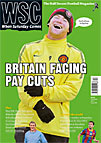 Manchester United are about to be floated on Singapore’s stock exchange. Ashley Shaw explores the motives behind the move.
Manchester United are about to be floated on Singapore’s stock exchange. Ashley Shaw explores the motives behind the move.
Having suffered jibes that they are the “Pride of Singapore” for several years now, the news that Manchester United are to be floated on that country’s stock exchange would seem to be entirely appropriate. Mystery surrounds the precise sums involved in the supposed IPO (initial public offering) and the move seems to have baffled the financial press. Some are asking whether having won four titles out of five and reached three Champion League finals in five years, the Glazers believe the club have reached a peak. There are also suggestions that they have been tipped the wink about Sir Alex Ferguson’s imminent departure. But it may simply be that they are once again looking to milk more from the United cash cow.
Of particular interest to supporters is the final destination of these funds. This summer Liverpool and Manchester City spent fortunes in the transfer market, with City in particular seemingly able to lure United’s transfer targets with huge salaries. So fans are entitled to wonder if some of this money will be used to strengthen a squad now containing young, promising but as yet unproven talent.
The initial answer would appear to be no and that the windfall could be used to pay down a portion of the £400 million debt that costs the club £45m a year to finance. Then there is the question of the £250m “acquired” from as yet unknown sources to pay off the high-interest PIK (payment in kind) notes last year and the ailing nature of the Floridians’ other businesses, which has led some to suggest that the funds may be earmarked for “personal profits”.
Optimists may point to this being the beginning of a long exit strategy for the owners and, of course, any flotation weakens the Glazers’ hold on to the club to a degree. Learning from the failures of United’s last period of public ownership, fan groups are already talking up the possibility of buying a stake, even if the £2 billion valuation of the club may make that prohibitive. At the very least, any flotation would also lead to higher standards of transparency and the prospect of holding some sharper Glazer practices to account.
It is clear, however, that supporters have had an impact on the way the Glazers run the club. There’s little doubt that the “green and gold” campaign affected their strategies – prior to the protests they seemed hell-bent on double-digit ticket-price rises and taking profits as and when they saw fit.
Ever since the furore surrounding the
bond prospectus, the Glazers seem more interested in placating fans, whether by freezing prices or being seen to act in a more
conciliatory fashion.And while they have steered clear of selling stadium-naming rights, they have sought to sell advertising and/or corporate space on just about every other asset the club owns. It remains to be seen whether this constitutes good business or financial desperation.
The restraints on the manager remain. The club have slashed the players’ salary bill by £10m. Research by Andersred (andersred.blogspot.com) claims that the departures of Wes Brown, John O’Shea, Gary Neville, Edwin van der Sar, Paul Scholes and Owen Hargreaves, and their replacement by Phil Jones, David de Gea and Ashley Young, means a net saving of £205,000 a week. In an era when Manchester City, in particular, are intent on buying success by offering eye-watering salaries, United’s stance should be lauded. But the fear remains that a lack of quality in the squad will tell over the course of the season.
Despite almost identical, emphatic starts to the season, the contrast between the local rivals could not be greater. City look like a club in a desperate hurry, with pressure beginning to be exerted from the top and UEFA’s Financial Fair Play rules forgotten in the rush for trophies. United would normally sit this season out; they are team clearly in transition with a new goalkeeper, defence and midfield to accommodate, and it remains to be seen if their free-scoring start is illusory.
Nevertheless, the fact that the manager continues to deliver, regardless of the considerable financial obstacles put in his way, remains one of the more remarkable stories in recent football history.
From WSC 296 October 2011
 MPs want the way football is governed to change, but the game’s authorities are happy to protect their own financial interests over the needs of fans, writes Andy Green
MPs want the way football is governed to change, but the game’s authorities are happy to protect their own financial interests over the needs of fans, writes Andy Green


